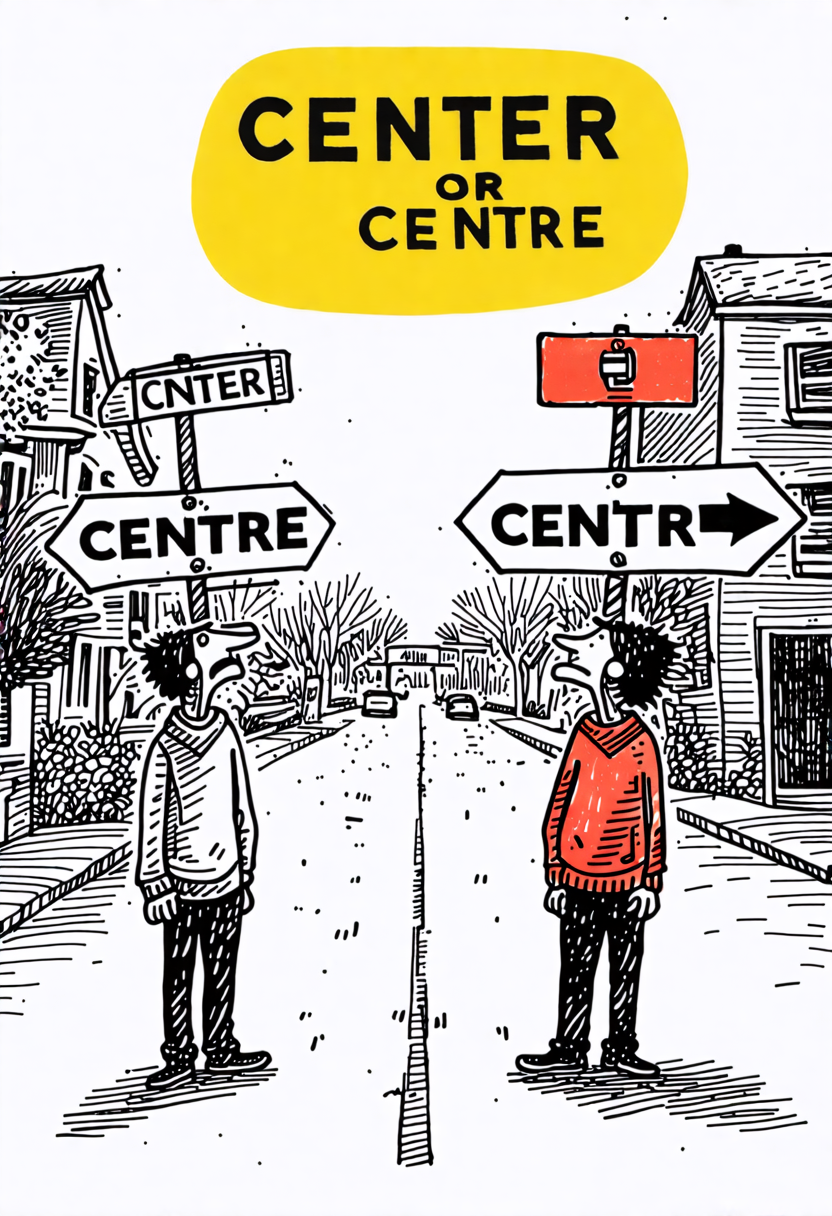Center or Centre
The correct spelling—’center’ or ‘centre’—depends on the variety of English you are using. In American English, ‘center’ is correct. In British English, ‘centre’ is preferred. These differences are seen in words like ‘color’ vs. ‘colour’ and ‘theater’ vs. ‘theatre’.
American English: ‘Center’
In American English, the term ‘center’ is commonly used in various contexts, including sports, medical facilities, and discussions of focus or importance.
For example, a young athlete might play the center position on a basketball team, demonstrating its use in sports.
In medical contexts, a doctor may be proud to work at a medical center, highlighting the term’s relevance in healthcare.
Additionally, conversations at conferences can center on critical issues like childhood obesity, showing the word’s application in discussions of focus.
Legal and social contexts also use ‘center,’ as seen when a man at the center of a corruption case is discussed.
British English: ‘Centre’
British English favors the spelling ‘centre,’ which is prevalent in various contexts such as sports facilities, educational programs, and technology initiatives.
For instance, the National Sports Centre in Buckinghamshire is a well-known facility. Similarly, the STEM centre at Airbus in Stevenage focuses on the Mars rover exploration program.
The use of ‘centre’ is widespread in British publications and official documents, reflecting regional language preferences. This spelling is also commonly seen in names of institutions and programs, aligning with British English conventions.
Key Differences in Spelling
The key differences in spelling between American and British English are most evident in words like ‘center’ and ‘centre.’ These variations often include differences in suffixes and certain letters. Understanding these differences can help in recognizing regional preferences and enhancing language proficiency.
Below are four notable distinctions:
- ‘Center’ vs. ‘Centre’: American English uses ‘center,’ while British English prefers ‘centre.’
- ‘Color’ vs. ‘Colour’: Americans drop the ‘u’ in ‘color,‘ whereas the British retain it in ‘colour.’
- ‘Analyze’ vs. ‘Analyse’: In American English, ‘analyze’ is correct; in British English, it’s ‘analyse.’
- ‘Theater’ vs. ‘Theatre’: Americans write ‘theater,’ but the British use ‘theatre.’

Center in Daily Usage
Whether used as a noun or verb, ‘center’ frequently appears in various aspects of daily American life. Athletes often play the center position on sports teams, and discussions at conferences may center on pressing issues like childhood obesity.
Medical professionals work at healthcare centers, providing essential services. Legal and societal issues can place individuals at the center of corruption cases, drawing significant public attention.
Refugee centers, such as those in Serbia, highlight humanitarian efforts and often appear in news reports. The term ‘center’ is versatile, encapsulating pivotal roles and focal points in diverse contexts, from sports and healthcare to legal matters and humanitarian aid.
Centre in Daily Usage
In various facets of daily life in the UK, ‘centre’ serves as a focal point in both public and private sectors. This spelling is deeply embedded in British English and is prevalent across numerous contexts.
Here are four key examples:
- Sports Facilities: Many community and national sports centres provide venues for physical activities and events.
- Educational Institutions: STEM centres at universities and companies foster innovation and learning.
- Healthcare: Medical centres offer a range of health services, from routine check-ups to specialized treatments.
- Cultural Hubs: Arts centres host exhibitions, performances, and cultural activities, enriching the community.
Examples From U.S. Media
Numerous examples from U.S. media highlight the consistent use of ‘center’ in various contexts. Major news outlets like Long Island News 12 and U.S. News & World Report frequently employ the American spelling. For instance, reports on the corruption case involving the former Suffolk police chief use ‘center’ to describe his pivotal role. Similarly, coverage of Serbia’s lockdown for migrants in their refugee center utilizes the American variant.
Here is a brief overview:
| Example | Source | Context |
|---|---|---|
| Man at the center of corruption case | Long Island News 12 | Legal news |
| Lockdown in refugee center | U.S. News & World Report | International news |
| Medical center | Various health articles | Healthcare |
| Center position in sports | Sports news | Athletics |
Examples From U.K. Media
Highlighting the British preference for ‘centre’, U.K. media frequently use this spelling in their reports. Examples from prominent publications illustrate this trend:
- Daily Mail reported on the Countess of Wessex’s visit to the National Sports Centre in Buckinghamshire, emphasizing its state-of-the-art facilities.
- BBC News showcased the STEM centre at Airbus in Stevenage, focusing on its role in the Mars rover exploration program.
- The Guardian highlighted technology initiatives at various research centres across the United Kingdom.
- The Independent covered events held at cultural centres, demonstrating the term’s widespread use in different contexts.
Influence of Regional Preferences
Regional preferences heavily shape the choice between ‘center’ and ‘centre’ in English usage. In the United States, ‘center’ is the standard spelling, reflecting American English norms.
Conversely, in the United Kingdom and other Commonwealth countries, ‘centre’ is preferred, aligning with British English conventions. These preferences are deeply rooted in cultural and historical contexts.
Therefore, publications, educational institutions, and businesses typically adhere to the regional spelling norms. This distinction extends beyond mere spelling; it signifies broader linguistic identities and influences.
Language Evolution Insights
Language evolution offers fascinating insights into how spelling variations like ‘center’ and ‘centre’ emerged and persisted over time. These variations are not arbitrary but reflect broader linguistic and cultural shifts.
Here are four key factors that influenced their development:
- Historical Influences: Early English settlers in America adopted simplified spellings, leading to ‘center’ instead of ‘centre.’
- Standardization Efforts: Efforts by figures like Noah Webster in the U.S. formalized many spelling differences.
- Cultural Identity: Both American and British English reflect their unique identities through distinct spelling conventions.
- Globalization: Although globalization promotes uniformity, regional spelling preferences persist due to historical and cultural ties.







